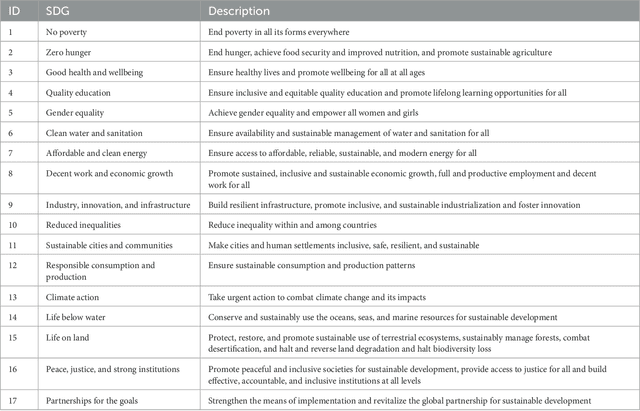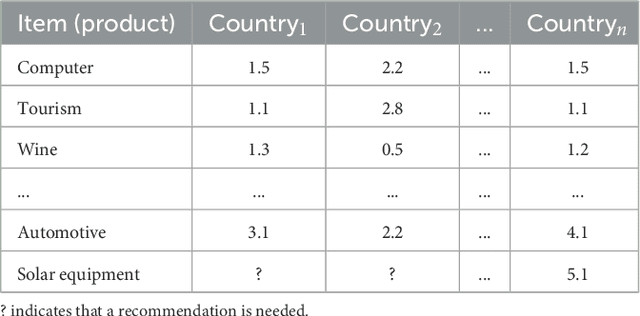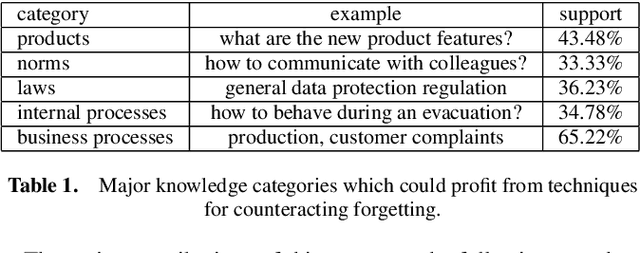Manfred Wundara
Recommender Systems for Sustainability: Overview and Research Issues
Dec 04, 2024



Abstract:Sustainability development goals (SDGs) are regarded as a universal call to action with the overall objectives of planet protection, ending of poverty, and ensuring peace and prosperity for all people. In order to achieve these objectives, different AI technologies play a major role. Specifically, recommender systems can provide support for organizations and individuals to achieve the defined goals. Recommender systems integrate AI technologies such as machine learning, explainable AI (XAI), case-based reasoning, and constraint solving in order to find and explain user-relevant alternatives from a potentially large set of options. In this article, we summarize the state of the art in applying recommender systems to support the achievement of sustainability development goals. In this context, we discuss open issues for future research.
Sports Recommender Systems: Overview and Research Issues
Dec 06, 2023



Abstract:Sports recommender systems receive an increasing attention due to their potential of fostering healthy living, improving personal well-being, and increasing performances in sport. These systems support people in sports, for example, by the recommendation of healthy and performance boosting food items, the recommendation of training practices, talent and team recommendation, and the recommendation of specific tactics in competitions. With applications in the virtual world, for example, the recommendation of maps or opponents in e-sports, these systems already transcend conventional sports scenarios where physical presence is needed. On the basis of different working examples, we present an overview of sports recommender systems applications and techniques. Overall, we analyze the related state-of-the-art and discuss open research issues.
Concentrating on the Impact: Consequence-based Explanations in Recommender Systems
Aug 31, 2023
Abstract:Recommender systems assist users in decision-making, where the presentation of recommended items and their explanations are critical factors for enhancing the overall user experience. Although various methods for generating explanations have been proposed, there is still room for improvement, particularly for users who lack expertise in a specific item domain. In this study, we introduce the novel concept of \textit{consequence-based explanations}, a type of explanation that emphasizes the individual impact of consuming a recommended item on the user, which makes the effect of following recommendations clearer. We conducted an online user study to examine our assumption about the appreciation of consequence-based explanations and their impacts on different explanation aims in recommender systems. Our findings highlight the importance of consequence-based explanations, which were well-received by users and effectively improved user satisfaction in recommender systems. These results provide valuable insights for designing engaging explanations that can enhance the overall user experience in decision-making.
KnowledgeCheckR: Intelligent Techniques for Counteracting Forgetting
Feb 15, 2021



Abstract:Existing e-learning environments primarily focus on the aspect of providing intuitive learning contents and to recommend learning units in a personalized fashion. The major focus of the KnowledgeCheckR environment is to take into account forgetting processes which immediately start after a learning unit has been completed. In this context, techniques are needed that are able to predict which learning units are the most relevant ones to be repeated in future learning sessions. In this paper, we provide an overview of the recommendation approaches integrated in KnowledgeCheckR. Examples thereof are utility-based recommendation that helps to identify learning contents to be repeated in the future, collaborative filtering approaches that help to implement session-based recommendation, and content-based recommendation that supports intelligent question answering. In order to show the applicability of the presented techniques, we provide an overview of the results of empirical studies that have been conducted in real-world scenarios.
 Add to Chrome
Add to Chrome Add to Firefox
Add to Firefox Add to Edge
Add to Edge